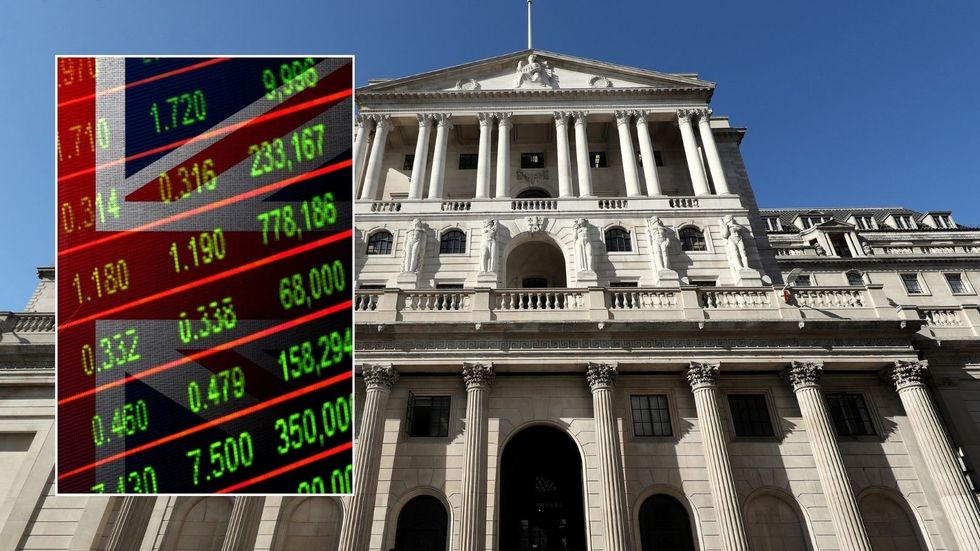The UK economy is growing stronger than expected
GETTY
Gross domestic product (GDP) recorded a 0.2 per cent growth in August, according to latest figures
Don't Miss
Most Read
Trending on GB News
The UK economy grew in August after it was flat in the previous two months, according to the ONS.
It was in line with economist predictions but is nevertheless a boost for new Chancellor Rachel Reeves ahead of this month’s autumn Budget.
The Office for National Statistics (ONS) said gross domestic product (GDP) recorded 0.2 per cent growth in August, up from no growth in June or July.
Services output was the main contributor to the growth in the three months to August, rising by 0.1 per cent.
There was also a one per cent increase in construction output, while production output showed no growth over this period.
Liz McKeown, ONS director of economic statistics said: “All main sectors of the economy grew in August, but the broader picture is one of slowing growth in recent months, compared to the first half of the year.
 A Bank of England policymaker is calling on interest rates to remain higher for "longer" GETTY/PA
A Bank of England policymaker is calling on interest rates to remain higher for "longer" GETTY/PA “In August, accountancy, retail and many manufacturers had strong months while construction also recovered from July’s contraction.
“These were partially offset by falls in wholesaling and oil extraction.”
Joe Nellis, MHA’s economic adviser, commented on today’s GDP data saying: “While the moderate growth in GDP announced this morning will no doubt be welcomed by the Government and business, they do reflect a UK economy that has been close to stagnation since July.
“The over cautious and at times negative messages coming from the Government and an air of uncertainty in the lengthy lead-up to the budget have certainly discouraged corporate investment and household expenditure.
“However, confidence in the UK economy has also been undermined by ongoing geopolitical turbulence – exacerbated by recent escalations in the Middle East – an unusually long wait for the new government’s budget, and the wet weather reducing economic activity. This has all combined to dampen the ‘animal spirits’ that underpin consumer confidence.
“The Government's slow pace in addressing the problem of disappointing economic growth is not entirely by choice. They have faced a series of unfortunate delays, including the Office for Budget Responsibility requiring 10 weeks’ notice from the Government to prepare its pre-Budget economic and fiscal forecasts, as well as the interruptions caused by the summer parliamentary recess and the party conference season. These delays have impeded the timely communication of a coherent economic strategy to inspire confidence.
“The Government will be hoping that their long overdue Budget and a possible cut in interest rates by the Bank of England early next month will create a more conducive environment for investment, reigniting growth in the UK economy.”
The Bank of Engalnd (BoE) uses GDP and inflation as key indicators when determining the base rate.
This decides how much it will charge banks to lend them money and is a way to try to control inflation and the economy.
The Consumer Prices Index (CPI) rate of inflation stood at 2.2 per cent in August, following a slight rise from two per cent the previous month.
However, this is still significantly lower than October 2022, when it peaked at 11.1 per cent following soaring wholesale energy prices.
It's important to note when inflation falls that doesn't mean prices have stopped rising, they are just increasing at a slower pace.
The BoE will be watching the latest GDP figures closely as it decides whether to lower its base rate further in November.
The central bank cut the base rate from 5.25 per cent to five per cent in August before holding it at this rate again in September. High street banks and lenders use the BoE base rate to set their own interest rates on mortgages, loans and savings accounts.
If it comes down, interest rates on mortgages, loans and savings accounts tend to fall too. Mortgage lenders also tend to bring down rates in anticipation of the base rate falling.
The next Bank of England base rate review is scheduled for Thursday, November 7.







